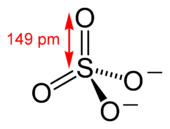Sulphate
 |
|||
|
|
|||
| Names | |||
|---|---|---|---|
|
Systematic IUPAC name
Sulfate
|
|||
| Identifiers | |||
| 14808-79-8 | |||
| 3D model (Jmol) | Interactive image | ||
| ChEBI | CHEBI:16189 | ||
| ChemSpider | 1085 | ||
| ECHA InfoCard | 100.108.048 | ||
| EC Number | 233-334-2 | ||
| PubChem | 1117 | ||
|
|||
|
|||
| Properties | |||
| SO2− 4 |
|||
| Molar mass | 96.06 g·mol−1 | ||
|
Except where otherwise noted, data are given for materials in their standard state (at 25 °C [77 °F], 100 kPa).
|
|||
| Infobox references | |||
The sulfate or sulphate (see spelling differences) ion is a polyatomic anion with the empirical formula SO2−
4. Sulfate is the spelling recommended by IUPAC, but sulphate is used in British English. Salts, acid derivatives, and peroxides of sulfate are widely used in industry. Sulfates occur widely in everyday life. Sulfates are salts of sulfuric acid and many are prepared from that acid.
The sulfate anion consists of a central sulfur atom surrounded by four equivalent oxygen atoms in a tetrahedral arrangement. The symmetry is the same as that of methane. The sulfur atom is in the +6 oxidation state while the four oxygen atoms are each in the state. The sulfate ion carries an overall charge of −2 and it is the conjugate base of the bisulfate (or hydrogen sulfate) ion, HSO−
4, which is in turn the conjugate base of H
2SO
4, sulfuric acid. Organic sulfate esters, such as dimethyl sulfate, are covalent compounds and esters of sulfuric acid. The tetrahedral molecular geometry of the sulfate ion is as predicted by VSEPR theory.
...
Wikipedia

